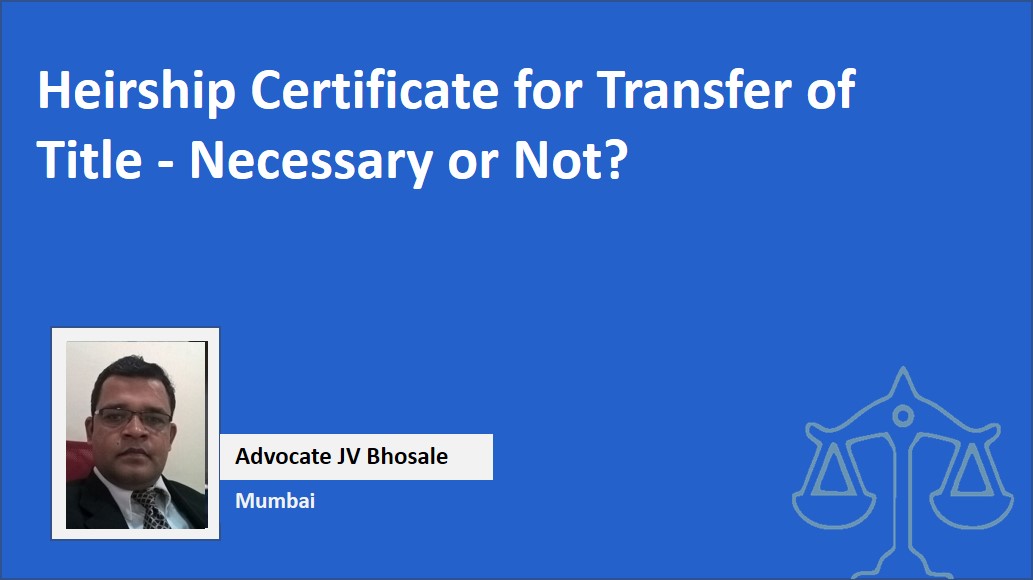Child Adoption laws in India (2019)
April 07, 2024Table of Contents
- What are the laws governing Adoption in India?
- Which Statutory Body regulates the adoption process in India?
- Who can place in for adoption?
- Where do families who are willing to adopt go?
- What is the procedure for adopting a family?
- What are provisions w.r.t International Adoption?
- Why do you Need a Lawyer?
Adopting a child is certainly a huge decision one can make. There are a lot of considerations that are to be dwelled upon before making a move. It influences you emotionally and financially. There are questions not only w.r.t your capability as a possible new parent to the child, but you also need to face numerous legal complexities that come along with it.
What are the laws governing Adoption in India?
Adoption is a legal affiliation of a child and it forms the subject matter of personal law. There are three major legislations governing the adoption process in India: The Hindu Adoption and Maintenance Act of 1956, the Guardians and Wards Act of 1890, and the Juvenile Justice (Care and Protection) Act of 2000, amended in 2006. The adoption under Hindu law is governed by the Hindu Adoption and Maintenance Act of 1956. Muslims, Christians, and Parsis have no adoption laws and have to approach the court under the Guardians and Wards Act, 1890. Muslims, Christians, and Parsis can take a child under the said Act only under foster care. People of these faith, adopt under Guardians and Wards Act of 1890.
Which Statutory Body regulates the adoption process in India?
All adoptions in India are required to follow the procedure set out by the Central Adoption Resource Agency (CARA).
Who can place in for adoption?
The child's biological parents have the right to relinquish their child to licensed adoption agencies. These agencies draw paperwork to legally terminate the biological parent's rights. They are given 60 days after the papers are signed to be as sure as possible before their rights are irrevocably terminated. At the end of 60 days after the relinquishment, the child becomes a ward of the state, and the process to find a more permanent solution is started.
Where do families who are willing to adopt go?
An aspiring adoptive family will need to approach a licensed agency. The list of licensed adoption agencies is available at the CARA website. Thereafter, they undergo a process of counseling so that they get a more realistic expectation of adoptive parenting and complete the paperwork required.
What is the procedure for adopting a family?
Paperwork: For an aspiring adoptive parent, paperwork is the start of the legal process of adopting a child. It evaluates their strengths and addresses any weaknesses their application may have. People applying as single parents are required to show evidence of a support system for the child. The list of documents required for adoption are:
-
Marriage Certificate or an affidavit.
-
Birth certificate or any proof of age.
-
Income Certificate or tax returns papers
-
Bank references and property statement
-
Medical certificates of prospective adoptive parents (recommending them for adoption) and their children, if any.
-
Infertility report, if applicable, or a medical report of the couple's prospects for having biological children.
-
Three reference letters recommend the couple as adoptive parents.
-
A letter stating alternate child care arrangements, in case the adoptive mother is working.
-
Photograph of the couple.
-
Adoption Decree of previously adopted children (if applicable)
-
Home Study Report prepared by a qualified social work from a social welfare agency, as well as an & lsquo undertaking' by the social worker or agency that they would send a follow-up report as per the requirements of the Indian Court.
-
For inter-country adoptions, the Home Study Report must be prepared by an agency that has been approved by the Government of India. Permission must be secured for the child's entry into the foreign country.
Home Visit: A home study involves a visit to the prospective adoptive home to get an idea of the couple/person applying. It is undertaken by the social worker or a child adoption agency. After the home study, the couple/person is listed on the agency's waitlist. The time between completing the application and identifying the child for placement is influenced by how many adoptive families have been placed on the waitlist and how many children have been cleared for adoption. Placing the child: The agency tries to match some features of the child with the adoptive family in the interest of the child. Once a child is identified, he/she is placed with the family under & lsquo foster care', before the adoption deed is finalized. This part of the process can take some time given the court's workload. Until the adoptive deed is final, the adoption is not legally final. Birth Certificate: When the adoption deed is issued by the courts, the adoptive family can apply through the courts for a birth certificate. The birth certificate with the agency's name as the parent is superseded by the new birth certificate issued. The new birth certificate mentions the adoptive parent(s) names as Father/Mother.
What are provisions w.r.t International Adoption?
Indian citizens, NRIs, and non-Indians residing outside India can adopt a child from India. While these adoptions are also legalized under one of the three Acts mentioned above. The rules related to these adoptions can be different. Assessing the capability of the applicant A Child Welfare Agency licensed by the government of the country in which the foreigner resides must sponsor every application of a foreigner for the adoption of an Indian child. This agency will appoint a professional social worker to prepare a Home Study Report that will indicate the basis for the sponsorship of the foreigner's application. Additional documents that are required to be submitted In addition to the list of documents mentioned above a declaration of willingness shall also be submitted. This document will state that the foreigner is willing to be appointed as the child's guardian. He shall also furnish an undertaking that he will adopt the child in accordance with the law of the country in which he resides at the earliest, but not later than two years from the date of the child's arrival in his country. Court Procedure The application for guardianship must be made before the court of the District Judge within whose jurisdiction the Social and Welfare Child Agency in India that is processing the application of the foreigner is located. The application will be filed by the Indian welfare agency or a person duly authorized by them in this regard. The Court will issue notice to the Indian Council for Child Welfare (ICCW) and the Indian Council for Social Welfare (ICSW) to scrutinize the guardianship application. These organizations are expected to give their considered opinion on whether they believe that adoption by the foreign national is in the child's best interests.
Why do you Need a Lawyer?
Adoption laws in India can be confusing. In order to get clarity whether you can adopt a child or not based upon your gender, age, or religion, you can approach a family lawyer. If you have been wronged by someone regarding your rights, you can seek legal remedies. A good family lawyer will help you in your legal proceedings at every step of the way. A lawyer will help and guide you in the right direction after understanding the specific facts and circumstances of your case. He/She will draft the required suit/documents/legal notices, will devise the best method you need to undertake in order to get justice, and will also represent you in the courts if need be. Thus, hiring a family lawyer will help you in more ways than one. You can also use LawRato's Ask a Free Question service to get free advice on your legal issue from expert lawyers.
These guides are not legal advice, nor a substitute for a lawyer
These articles are provided freely as general guides. While we do our best
to make sure these guides are helpful, we do not give any guarantee that
they are accurate or appropriate to your situation, or take any
responsibility for any loss their use might cause you. Do not rely on
information provided here without seeking experienced legal advice first. If
in doubt, please always consult a lawyer.
The internet is not a lawyer and neither are you.
Talk
to a real lawyer about your legal issue.

Comments by Users
No Comments! Be the first one to comment.
Family Law Articles
User Reviews
Helped a lot in understanding the law.
great content. Thanks.
more info needed on the law
thanks for the information
nice article. Thanks for the information
It’s a very nice article.
nicely explained. Thanks fro the information
Very good article
nice work. Learned a lot. Thanks
nice artcile
Gave a clear understanding about my legal issue.
thanks for the advice
nice article
Written in a very simple language.
Written plainly to be understood by anyone who is from a non-legal background.
Gave me a very clear idea of the subject.
Very nice article.
loved the way concept is explained. Nicely written for any layman to understand.
VIEW ALL


 642+ Lawyers are online
642+ Lawyers are online 









_.jpg)